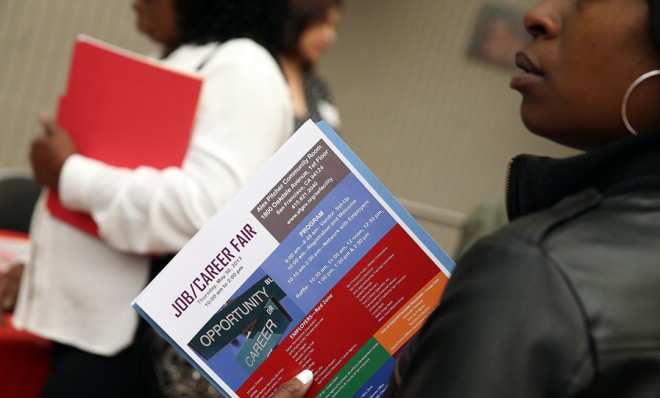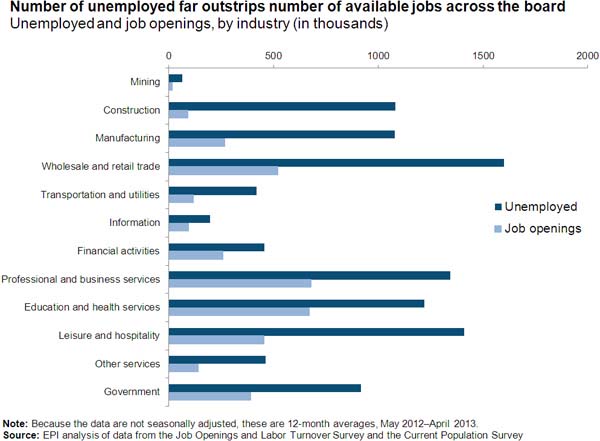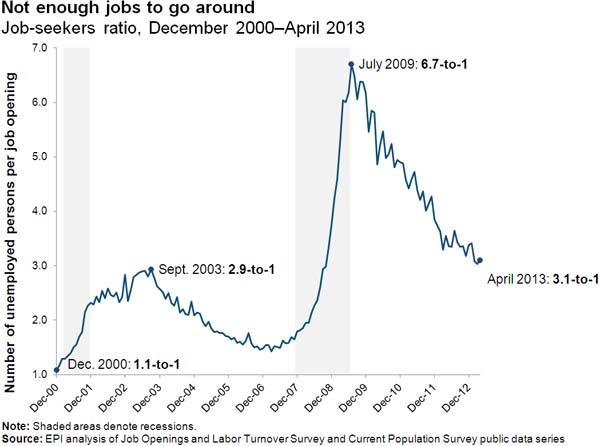There are 3 unemployed workers for every job opening
The labor market remains a very bleak place

A free daily email with the biggest news stories of the day – and the best features from TheWeek.com
You are now subscribed
Your newsletter sign-up was successful
Despite modest GDP growth, unemployment is still a huge problem in America, a report released Tuesday by the Bureau of Labor Statistics confirms.
Heidi Shierholz from the Economic Policy Institute crunched the numbers and created some pretty depressing charts. Here is the number of unemployed people compared to the number of job openings, per industry.

Yes, it's as bad as it looks. In April, the average "job-seekers ratio" was 3.1-to-1, which means there were more than three unemployed people for every available job. In construction, the ratio was 12-to-1.
The Week
Escape your echo chamber. Get the facts behind the news, plus analysis from multiple perspectives.

Sign up for The Week's Free Newsletters
From our morning news briefing to a weekly Good News Newsletter, get the best of The Week delivered directly to your inbox.
From our morning news briefing to a weekly Good News Newsletter, get the best of The Week delivered directly to your inbox.
Shierholz said the numbers prove that "the main problem in the labor market is a broad-based lack of demand for workers — and not, as is often claimed, available workers lacking the skills needed for the sectors with job openings."
The Atlantic's Jordan Weissman wonders if "companies used the recession as a chance to lay off employees whose talents were no longer valuable to them and have yet to find replacements with fresher skills."
Whatever the reason for the gap, the fact remains that, for job-seekers, the economy is still rough. Shierholz whipped up another chart showing the job-seekers ratio for the last 13 years.

Note that the current ratio — while a vast improvement over July 2009's high of 6.7-to-1 — is still worse than the aftermath of the last recession, which followed the bursting of the dot-com bubble.
A free daily email with the biggest news stories of the day – and the best features from TheWeek.com
What's the problem? While layoffs have held steady, hiring hasn't increased enough to compensate for previous losses, meaning, according to Shierholz, "the consequences for workers of being laid off are far worse now than before the recession began; workers are far less likely to find a new job within a reasonable timeframe, particularly one that pays as much as the job they lost."
Keith Wagstaff is a staff writer at TheWeek.com covering politics and current events. He has previously written for such publications as TIME, Details, VICE, and the Village Voice.
-
 ‘Those rights don’t exist to protect criminals’
‘Those rights don’t exist to protect criminals’Instant Opinion Opinion, comment and editorials of the day
-
 Key Bangladesh election returns old guard to power
Key Bangladesh election returns old guard to powerSpeed Read The Bangladesh Nationalist Party claimed a decisive victory
-
 Judge blocks Hegseth from punishing Kelly over video
Judge blocks Hegseth from punishing Kelly over videoSpeed Read Defense Secretary Pete Hegseth pushed for the senator to be demoted over a video in which he reminds military officials they should refuse illegal orders